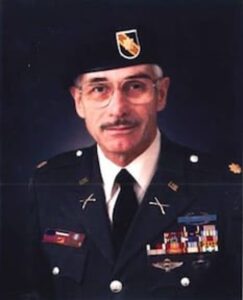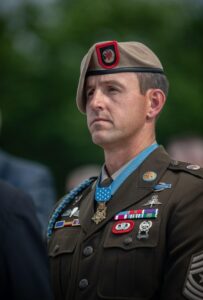
On October 30, 1945, United States Army Officer Freeman V. Horner was awarded the Medal of Honor for his heroic actions during World War II.
During the second World War, Sergeant Freeman Horner and his company were stationed in Nazi Germany. On November 16, 1944, Sergeant Horner and his company were attacking Wurselen, Germany and were experiencing heavy resistance. Ultimately, Sergeant Horner realized that enemy machine guns must be taken out. He ran into enemy fire in a position he thought was safe. Almost immediately, he was swarmed with enemy fire again as he returned fire, killing two hostile gunmen.
He continued running across the field to stop the machine guns that were preventing his men from being able to proceed. He continued to dodge fire, and as he got closer, the enemy gunmen abandoned their posts and took cover in a nearby cellar. Sergeant Horner followed them to the cellar, threw two grenades down the stairs, and called for their surrender. Thanks to his actions, three enemy machinegun positions were destroyed, seven enemies were killed or captured, and he cleared the path for his company’s successful assault on Wurselen.

Sergeant Horner went on to reach the commissioned officer rank of Major and continued to serve in the United States Army. He wasdeployed to the Korean War before leaving the Army. He went on to live his life in Columbus, Georgia with his wife who cared for him until his death of a brain aneurysm.
Freeman Horner is one of the over 3,500 Medal of Honor recipients whose combat valor and civic heroics will be enshrined in the National Medal of Honor Museum. These heroes deserve a home for their legacy to be shared with the next generations.
As the only military museum to recognize all branches of the armed services, it will highlight the fact that the recipients of our nation’s highest military award not only defended our country, they were instrumental in developing, designing, and enriching it.
The museum will be a vault for the values embodied in the medal: courage, sacrifice and patriotism. It will showcase the Congressional Medal of Honor Foundation Character Development Program, including living histories of over 100 recipients. It will also house the Citizens Heroes Program honoring ordinary citizens who have epitomized the concept of “service above self”.
Americans will walk out of the museum with the conviction that they too can be a hero, inspired by the values of courage and sacrifice that the Medal of Honor recipients used to excel in combat and in civilian life. Learn more at mohmuseum.org.

Navigating the Darkest Night | The Courageous Leadership of Rear Admiral Bruce McCandless
Recipient: Bruce McCandless Branch: U.S. Navy Combat: World War II Sometimes fate has a way of showing us exactly where we need to be and


